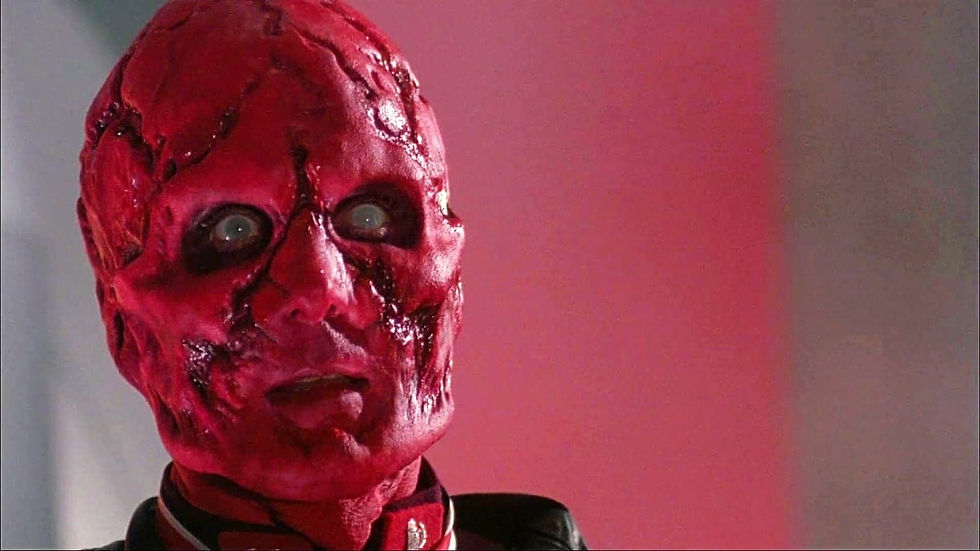Review - Captain America: Albert Pyun Cut
- ogradyfilm
- Aug 3, 2025
- 3 min read

Much like the legendary superhero around whom it revolves, the Menahem Golan-produced adaptation of Captain America is a relic of a bygone era. Before the now-ubiquitous concept of a “shared cinematic universe” existed, way back when comic book movies were still a relative rarity (Superman and Batman being exceptions to the rule rather than the norm), Marvel was in dire financial straits. In the midst of a full-blown industry implosion and desperate to scrounge up enough cash to remain afloat, the company licensed its vast library of characters to whoever was willing to pay (they couldn’t afford the luxury of waiting for the highest bidder)—including the infamously tight-fisted Cannon Group (and, following that studio’s eventual bankruptcy, its equally ill-fated successor: 21st Century Film Corporation).
Shot on a below-shoestring budget and unceremoniously dumped straight to video, the resulting interpretation of Captain America might have forever languished in obscurity, less fondly remembered than even Roger Corman’s unreleased Fantastic Four and James Cameron’s unrealized Spider-Man… had it not been for its late director, Albert Pyun.

Pyun was, in essence, a lifelong gun-for-hire, thanklessly churning out overlooked Z-movies—see Cyborg, Dollman, Arcade—that were, more often than not, marketed (complete with posters, newspaper ads, and hastily cobbled-together commercials) before principal photography had commenced. This is not, of course, a negative judgment of his talent; indeed, some of my favorite filmmakers toiled under similar circumstances. It is, however, an undeniable fact that such craftsmen tend to go unnoticed and unappreciated compared to more conventional/commercial “auteurs.”
Fortunately, due to the efforts of a small but passionate group of diehard fans, Pyun’s career has recently been reevaluated; many connoisseurs of low-brow cinema now celebrate him as an unsung genius, capable of stretching scant resources to the absolute breaking point, squeezing diamonds out of dung through sheer force of will. And the crowning achievement of this movement to elevate Pyun to the status of bona fide pop culture icon was the discovery of the director’s preferred cut of Captain America—preserved over the decades like a hidden treasure; previously screened exclusively for Pyun’s friends, colleagues, and biographers; and, finally, restored and publicly debuted to a packed theater at the Asian American International Film Festival.

I won’t exaggerate the quality of the finished product; there is, after all, only so much material that one can reasonably expect to salvage from a foundation as fundamentally flawed as the fucking Menahem Golan-produced adaptation of Captain America. Nevertheless, Pyun's cut goes a long way towards rehabilitating the movie’s bad reputation. The original version, for example, presented the plot in chronological order, lending it a pace that most critics described as flaccid and inert. The re-edit, on the other hand, begins in medias res and adopts an intermittent flashback structure, immediately establishing the stakes, significantly streamlining the exposition, and imbuing the narrative with a greater degree of urgency.
This tighter focus consequently clarifies the story’s central conflicts and core themes, allowing the strengths of screenwriter Stephen Tolkin’s (surprisingly somber) script to shine all the brighter. The Red Skull, for instance, emerges as a genuinely compelling foil to our protagonist. Whereas Cap is the archetypal fish out of water—a star-spangled idealist adrift in the unfamiliar cynicism of the late eighties/early nineties (symbolized by his tarnished costume, which is as frayed and tattered as the American Dream)—the Skull (reimagined as a victim of Italian fascist indoctrination, as opposed to a fanatical Nazi zealot) has perfectly adapted to the modern world, covertly shaping history from the shadows… and yet he takes no pleasure in the power and wealth that he’s accumulated. Aged and weary, he haunts the dreary corridors of his seaside fortress like a self-loathing phantom, surrounded by grim souvenirs of his past traumas (his beloved childhood piano, the laboratory equipment that transformed him into a monster).

This imagery isn't exactly subtle—but isn’t that appropriate, considering the genre? Comics are inherently stylized, defined by primary colors, bold shadows, and dynamic framing; Pyun embraces this maximalism with energy, enthusiasm, and—above all else—sincerity, evoking Richard Donner’s Superman and anticipating Sam Raimi’s Spider-Man trilogy. While Captain America doesn’t remotely rival those spandex-clad masterpieces, it is nonetheless a testament to its creator’s authorial voice and vision—which makes it a precious gem in its own right.





Comments